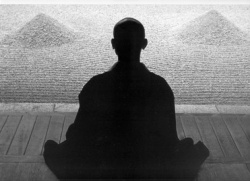Difference between revisions of "Mahāsattva"
Jump to navigation
Jump to search
| (2 intermediate revisions by the same user not shown) | |||
| Line 1: | Line 1: | ||
[[File:EK1.jpg|thumb|250px|]] | [[File:EK1.jpg|thumb|250px|]] | ||
| − | Mahāsattva, Sanskrit word belonging to the vocabulary of [[Mahāyāna | + | [[Mahāsattva]], [[Sanskrit]] [[word]] belonging to the vocabulary of [[Mahāyāna Buddhism]], meaning literally "[[great being]]", is a great [[Bodhisattva]] practicing the [[Buddhism]] for a long [[time]] and reaching a very high level on the [[path to awakening]] ([[Bodhi|bodhi]]), generally refers to the [[Bodhisattvas]] who have reached at least the [[seventh ground]] of the ten [[Bodhisattvas]]' grounds ([[bodhisattvānām daśabhūmīḥ]]). |
| − | The translation of the word Mahāsattva in Chinese is móhé sāduò 摩诃萨埵 (often simplified in móhésà 摩诃萨) and dàshì 大士, in Japanese, makasatsu or daishi. | + | The translation of the [[word]] [[Mahāsattva]] in {{Wiki|Chinese}} is [[móhé sāduò]] [[摩诃萨埵]] (often simplified in [[móhésà]] [[摩诃萨]]) and [[dàshì]] [[大士]], in {{Wiki|Japanese}}, [[makasatsu]] or [[daishi]]. |
| − | The eight most famous Mahāsattvas are Mañjuśrī, Samantabhadra, [[Avalokiteśvara|Avalokiteśvara]], Mahāsthāmaprāpta, Âkāśagarbha ([[Akasagarbha|Akasagarbha]]), Kṣitigarbha, [[Maitreya|Maitreya]] and Sarvanīvaraṇaviṣkambhin (Sarvanivarana-Vishkambhin). | + | The eight most famous [[Mahāsattvas]] are [[Mañjuśrī]], [[Samantabhadra]], [[Avalokiteśvara|Avalokiteśvara]], [[Mahāsthāmaprāpta]], [[Âkāśagarbha]] ([[Akasagarbha|Akasagarbha]]), [[Kṣitigarbha]], [[Maitreya|Maitreya]] and [[Sarvanīvaraṇaviṣkambhin]] ([[Sarvanivarana-Vishkambhin]]). |
| + | [[Mahasattva]]. | ||
{{W}} | {{W}} | ||
[[Category:Mahayana]] | [[Category:Mahayana]] | ||
[[Category:Buddhist Terms]] | [[Category:Buddhist Terms]] | ||
| − | |||
[[Category:Bodhisattva's]] | [[Category:Bodhisattva's]] | ||
Latest revision as of 07:18, 17 January 2015
Mahāsattva, Sanskrit word belonging to the vocabulary of Mahāyāna Buddhism, meaning literally "great being", is a great Bodhisattva practicing the Buddhism for a long time and reaching a very high level on the path to awakening (bodhi), generally refers to the Bodhisattvas who have reached at least the seventh ground of the ten Bodhisattvas' grounds (bodhisattvānām daśabhūmīḥ).
The translation of the word Mahāsattva in Chinese is móhé sāduò 摩诃萨埵 (often simplified in móhésà 摩诃萨) and dàshì 大士, in Japanese, makasatsu or daishi.
The eight most famous Mahāsattvas are Mañjuśrī, Samantabhadra, Avalokiteśvara, Mahāsthāmaprāpta, Âkāśagarbha (Akasagarbha), Kṣitigarbha, Maitreya and Sarvanīvaraṇaviṣkambhin (Sarvanivarana-Vishkambhin).
